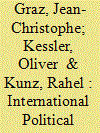|
|
|
Sort Order |
|
|
|
Items / Page
|
|
|
|
|
|
|
| Srl | Item |
| 1 |
ID:
135763


|
|
|
|
|
| Summary/Abstract |
Recent efforts to implement gender mainstreaming in the field of security sector reform have resulted in an international policy discourse on gender and security sector reform (GSSR). Critics have challenged GSSR for its focus on ‘adding women’ and its failure to be transformative. This article contests this assessment, demonstrating that GSSR is not only about ‘adding women’, but also, importantly, about ‘gendering men differently’ and has important albeit problematic transformative implications. Drawing on poststructuralist and postcolonial feminist theory, I propose a critical reading of GSSR policy discourse in order to analyse its built-in logics, tensions and implications. I argue that this discourse establishes a powerful ‘grid of intelligibility’ that draws on gendered and racialized dualisms to normalize certain forms of subjectivity while rendering invisible and marginalizing others, and contributing to reproduce certain forms of normativity and hierarchy. Revealing such processes of discursive in/exclusion and marginalized subjectivities can serve as a starting point to challenge and transform GSSR practice and identify sites of contestation.
|
|
|
|
|
|
|
|
|
|
|
|
|
|
|
|
| 2 |
ID:
122836


|
|
|
|
|
| Publication |
2013.
|
| Summary/Abstract |
Partnerships in international migration governance promise a cooperative approach between countries of origin, transit and destination. The literature has generally conceptualised migration partnerships as a policy instrument. This article suggests that understanding the broader transformations taking place in international migration governance under the rubric of partnership demands a novel analysis. Using a governmentality perspective, I interpret migration partnerships as an instance of neoliberal rule. Focusing on the convergence of international migration governance between the international realm and the European and North American region in particular, I demonstrate that the partnership approach frames international migration governance so as to enlist governments, migrants and particular experts in governing international migration, and invokes specific technologies of neoliberal governing which contribute to producing responsible, self-disciplined partners who can be trusted to govern themselves according to the norms established by the partnership discourse. The partnership approach is not a mere policy instrument; it goes beyond the European region and has become an essential element of the governance of international migration.
|
|
|
|
|
|
|
|
|
|
|
|
|
|
|
|
| 3 |
ID:
169782


|
|
|
|
|
| Summary/Abstract |
This forum opens a debate that is long overdue: for far too long, the fields of international political sociology (IPS) and international political economy (IPE) have been standing apart. Discussions take place in different conference sections, in different networks that publish in different journals. Yet, this divide is surprising given that the two fields share similar trajectories, theoretical concerns, problématiques, and conceptual challenges. This forum starts exploring this shared terrain: we believe that there is no a priori reason to separate the sociocultural, the political and the economic when we aim at making sense of the world in any meaningful way. We propose that bridging the IPE-IPS divide has tremendous potential for the development of a socio-political economy analysis that, we believe, has two benefits. First, it allows for the opening of new empirical terrains or deepening and widening existing ones. Second, bringing IPE/S back together creates reflexive spaces for more holistic, embodied and contextualised conceptual innovation. The contributors to this forum show each in their own way such empirical and conceptual added value of moving beyond the IPE and IPS divide in order to develop what we call here a socio-political economy of the globe. They focus on various issues, such as the transformation of capitalism from an oil- to a data-dependent accumulation regime with the rising of the so-called ‘digital age’ (Chenou); the profound social, economic and political transformation triggered by urbanisation in the development world (Elias, Rethel and Tilley); emerging global risks and the neglected role of the insurance industry (Lobo-Guerrero); regional development-security nexuses (Lopez Lucia); and business power in climate change diplomacy (Moussu).
|
|
|
|
|
|
|
|
|
|
|
|
|
|
|
|
| 4 |
ID:
085996


|
|
|
|
|
| Publication |
2008.
|
| Summary/Abstract |
This article traces the emergence of a new trend within the international community-the global remittance trend (grt)-and undertakes a critical gender analysis of the mainstream framing within it. The grt refers to the heightened interest of different actors-such as governments, international organisations, non-governmental organisations and private sector actors-in the development potential of international migration and remittances, and in the strategies designed to harness this potential. The main argument advanced is that in the debate about the framing of the grt gender dimensions have been largely absent and the mainstream framing is generally gender-blind. At the same time, however, it is infused with gendered representations and stereotypes, which have concrete gender-specific implications in terms of policy making. Illustrated with an example from rural Mexico, the paper demonstrates how policies based on such representations lead to complex and seemingly contradictory processes of gender exclusion and inclusion within the grt, and may have adverse gender implications.
|
|
|
|
|
|
|
|
|
|
|
|
|
|
|
|
|
|
|
|
|